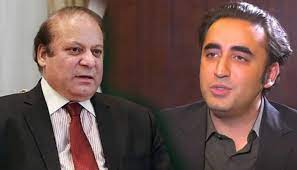
From Sharif to Bhutto-Zardari: How Pakistan’s Election Results Could Impact India-Pakistan Relations
With former prime minister Imran Khan in jail, Nawaz Sharif’s PML-N is tipped to emerge as the single largest party in the Pakistan elections.
Pakistan is holding its 12th national general elections on Thursday, February 8, to elect a new government, with multiple crises plaguing the nuclear-armed country of 241 million. Nawaz Sharif’s Pakistan Muslim League Nawaz will likely emerge as the single-largest party and Bilawal Bhutto Zardari’s Pakistan Peoples Party as a distant second followed by the Pakistan Tehreek-e-Insaf of Imran Khan and other parties, The News reported.
While former prime minister Imran Khan remains in jail, Nawaz Sharif is tipped to emerge as the main face for the prime minister’s post. Imran Khan’s Pakistan Tehreek-e-Insaf or PTI candidates are contesting the polls independently after the Supreme Court upheld the decision of the election commission to deprive the PTI of its iconic election symbol cricket ‘bat’.
Nawaz Sharif, 74, will be eying the prime ministership for a record fourth time in Thursday’s election. The contest also involves the PPP of Bilawal Bhutto-Zardari, who has been declared as the party’s prime minister face.
But whoever wins the February 8 elections will find a daunting task ahead due to the dwindling economy and deteriorating security situation. Last year, Pakistan narrowly averted a default when the International Monetary Fund or IMF provided a $3 billion short-term loan. Economic experts believe that the new government would need an urgent new IMF program on more stringent conditions.
Pakistan’s over two decades-old fight against terrorism is also unravelling as the rebels have resurged since 2021 after the Afghan Taliban came to power. The new government will find it tougher to deal with the militancy of the banned Tehreek-i-Taliban Pakistan and Baloch nationalists.
On its eastern border, fresh tensions have risen after Islamabad accused India of running an assassination campaign inside Pakistan that New India has rejected completely. India on January 25 strongly rejected Pakistan’s assertion of evidence implicating Indian agents in the targeted killings of two Pakistani citizens on its soil, dismissing it as “false and malicious anti-India propaganda”.
How India sees Pakistan election 2024?
India is also going to the Lok Sabha elections by May, and a return to power for the Narendra Modi-led government with a heavy mandate could further complicate matters for Pakistan’s new government.
The extent of the Pakistan Army’s influence on the country’s politics has become widely recognised, with allegations of election manipulation to favour its preferred candidates. In the 2018 elections, the Pakistan Army effectively “selected” Imran Khan, a cricket icon-turned-politician, to replace Nawaz Sharif as the leader of the PML(N). Imran Khan assumed the role of prime minister after Nawaz Sharif’s conviction, although Nawaz Sharif was subsequently permitted to leave the country, and only returned in October 2023, when suddenly all the cases against him vanished into thin air.
Experts have indicated that this time, Nawaz Sharif has the blessings of the army.
“What is scheduled to happen on February 8 seems less like an election and more like a selection because Pakistan’s Army has shown us in the past few days what result they are desiring in the upcoming elections. They want Nawaz Sharif to be selected,” news agency ANI quoted former high commissioner of India to Islamabad Ajay Bisaria as saying.
In the Pakistan election 2024, Pakistan Army chief general Asim Munir will consolidate his authority over the political leadership of the country. The elections are significant as for the first time in the history of Pakistan, the popularity of a civilian leader (Imran Khan) challenged the dominance of the army.
New Delhi would be closely monitoring all activities in its neighbouring country ahead of the elections, particularly focusing on the Pakistan Army’s involvement in selecting the next prime minister. India has persistently raised concerns about Pakistan’s ongoing support for terrorism, prompting the Narendra Modi-led government to adopt a stricter stance on national security matters.
“India has dealt with Pakistan’s generals who took charge of the country before. But General Munir’s quest for greater control may not be the movie we have seen before. To be sure, the dominant assumption in Delhi is that nothing ever changes in Pakistan. And that Pakistan’s generals will muddle along as they retain hold over Pakistan. Munir, however, is taking control amid the growing prospect that the old order in Pakistan is becoming unsustainable,” The Indian Express quoted geopolitical expert C Raja Mohan as saying.
In recent statements, Nawaz Sharif has shown a willingness to engage with India and has recognised the neighbouring country’s global progress. However, his party’s manifesto states a commitment to pursue peace with India only if New Delhi reverses its decision to revoke Article 370, which granted special status to Jammu and Kashmir.
Moneycontrol reported that a significant achievement of Prime Minister Narendra Modi’s foreign policy has been the marginalisation of Pakistan in India’s diplomatic agenda, a strategy that has proven effective thus far. This approach allows India to remain nonchalant about shifts in power in Islamabad while still adhering to the principle articulated by former Prime Minister Atal Bihari Vajpayee: “We can change our friends but not our neighbours.”

